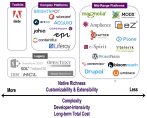Customer perspective on Oracle acquiring FatWire
Oracle today announced its acquisition of FatWire. The deal will formally close later this year. With this latest take-over, I'm officially giving up counting how many "Portal-type" offerings Oracle now owns.
First a little background. FatWire offers tools for managing different aspects of website production and engagement. These include its flagship "Content Server" for Web Content Management and few others, such as Community and Gadget Servers and a Mobility Server. Content Server itself has seen multiple owners in the past -- changing hands from Future Tense to Open Market to divine and then finally to FatWire. In fact you can still see mention of FutureTense in Content Server's XML code.
So what does this acquisition mean for you the customer? Here are my quick thoughts in no particular order.
- This hopefully brings an end to ownership changes and could mean more institutional stability for an otherwise well-regarded tool. In spite of having been acquired so many times, FatWire has always been rumored to be in the market to find a new owner. More recently, it flirted with EMC but finally found a suitor in Oracle. Oracle will likely invest more in R&D, to make improvements as well as target wider markets. Oracle will hopefully invest in improving performance, extensibility, and adherence to industry standards.
- Oracle is a tough contract negotiator, and incumbent FatWire customers may be in for a big jolt here, if you are already an Oracle shop, however, you may be able to locate a good deal
- Oracle already had Web Content Management capabilities as part of its own ECM suite (something it acquired from Stellent). However, like EMC, they focused more on Document and Records Management services, and proved unable to innovate at a pace expected of a WCM tool. This probably bodes poorly for those customers of the former Stellent platform who are focused on WCM (expect Oracle to try to convert you to FatWire).
- Going by past experience, Oracle will likely try to embed some of its own components into the Content Server platform, at first as an option, but then later as a requirement. The might include database, application server, and search engine, as well as possibly WebCenter Portal. Oraclization will prove a boon to some of you, but a bane to others; keep your eyes open
- Oracle also acquired ATG in late 2010. I think FatWire and ATG provide for some very interesting possibilities - if integrated well (note the emphasis). Sure, there are overlaps, but the two products have distinct strengths. While FatWire's strength is obviously managing web content, ATG's strengths reside in more delivery-tier oriented aspects such as catalog management and e-commerce. This is slightly different from the case of some other Oracle acquisitions, such PeopleSoft and JD Edwards which possibly had considerably more overlaps. Having said that, integration between two products is always a tough task, and real integration will take time
- The EMC relationship is now cloudy going forward. FatWire did invest considerable resources in their Documentum integration story and we don't know how long will they keep investing in that under Oracle. FatWire's site still has this page about their relationship with EMC but I'd be surprised if this page remains up for a long time. If you get a 404 error when you click on that link, you'd know the partnership is over.
We'll be watching and analyzing. Our research customers will receive a detailed advisory about this soon.








